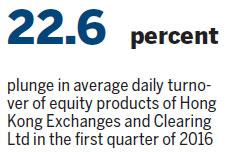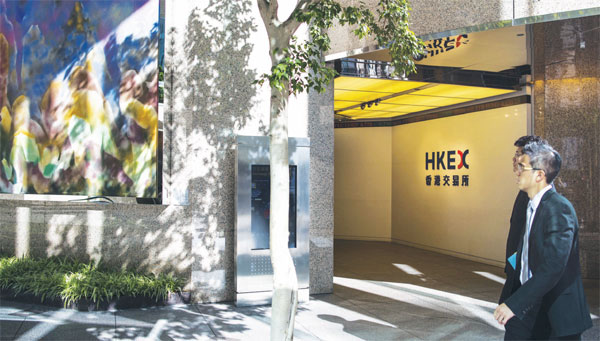HKEx profit shrinks as bears reign
Updated: 2016-05-12 07:50
By Oswald Chan in Hong Kong(HK Edition)
|
|||||||||
|
Pedestrians walk past an entrance to Hong Kong Exchanges & Clearing Ltd (HKEx) in Central. Experts believe that local and global market uncertainties have inhibited long-term capital being deployed in the equity asset class in Hong Kong, souring market turnover, on which HKEx depends so heavily for profit growth. Justin Chin / Bloomberg |
Bourse operator's Q1 net slips 9.1 percent on plunge in daily turnover
Hong Kong Exchanges and Clearing Ltd (HKEx) - the city's bourse operator - on Wednesday posted a 9.1-percent decline in profit attributable to shareholders for the first quarter of 2016, compared with a year ago, due to subdued market conditions and bearish investor sentiment.
With revenues and other income edging down mildly by 1.6 percent to HK$2.75 billion, the company said its bottom line was dragged down mainly by a 10-percent fall in revenue from its cash business.
The 10-percent revenue decrease stemmed from a plunge in HKEx's average daily turnover of equity products, which fell by 22.6 percent to HK$50.7 billion, indicating escalating lukewarm market sentiment throughout the period. HKEx's share price stayed flat at HK$185.8 at the close of trading on Wednesday, diving almost 40 percent from its peak of HK$297.4 apiece in April last year.
"The first quarter results reflect generally subdued market conditions, both locally and globally. Investor sentiment remained bearish during the first quarter 2016, which has been reflected in overall trading activity and the group's overall revenue," the company said in its quarterly announcement.
Profit attributable to shareholders from January to March slipped to HK$1.43 billion, while basic earnings per share dropped 12 percent to HK$1.19 apiece.
"HKEx's earning prospects in the coming three quarters will be sluggish because of the weak market sentiment in the cash and derivatives markets, the lack of synergy effect from its acquisition of the LME (London Metal Exchange) commodity trading business, as well as more mainland enterprises seeking listings on the mainland market that impedes the city's initial public offering (IPO) business," Kingston Securities' Research Executive Director Dickie Wong Tak-kei told China Daily.
HKEx said its acquisition of LME was completed in December 2012, allowing the former to gain exposure in the commodity trading business to diversify the bourse's revenue streams. In the first quarter of this year, revenue from the trading of equity and financial derivatives ballooned 20 percent, while commodity trading income dipped 9 percent.

Operating expenses, meanwhile, soared 19 percent to HK$854 million, reflecting the cost of additional headcount and higher legal and professional fees incurred to support strategic initiatives during the review period.
"In response to continued uncertainty in market conditions, the group is adopting a prudent approach to expenditure control as we move into the second quarter this year. This is both a means to manage capital expenditure while facilitating a more modest increase in headcount this year," HKEx said.
The planned delisting of some Hong Kong- or US-listed mainland enterprises in a bid to gain a higher valuation premium by relisting on the mainland bourses has also raised eyebrows recently.
"Even the proposed Shenzhen-Hong Kong Stock Connect could only bestow a short-term stimulus on stock trading on the Hong Kong bourse," Wong said.
The Shenzhen-Hong Kong Stock Connect, after the Shanghai "through train", will be the second cross-border stocks trading link, under which mainland and Hong Kong investors will be able to trade shares on each other's market through local brokers and clearing houses.
The Shenzhen-Hong Kong stocks link is widely expected to kick off in the third quarter of the year to boost market trading volumes by further allowing international investors to tap into the Shenzhen bourse, which features small-cap stocks of the world's second biggest economy.
"We expect HKEx's earning performance to continue being sluggish until the fourth quarter, when listed companies may announce more positive news and the IPO market may resume more vibrancy in the same period," said Patrick Shum Hing-hung, an investment manager at Tengard Fund Management.
"Market uncertainties surrounding US interest-rate policies, mainland economic policy directions and possible political changes after political elections have inhibited long-term capital being deployed in the equity asset class, curtailing market turnover, on which HKEx depends so heavily for profit growth," Shum said.
(HK Edition 05/12/2016 page7)
